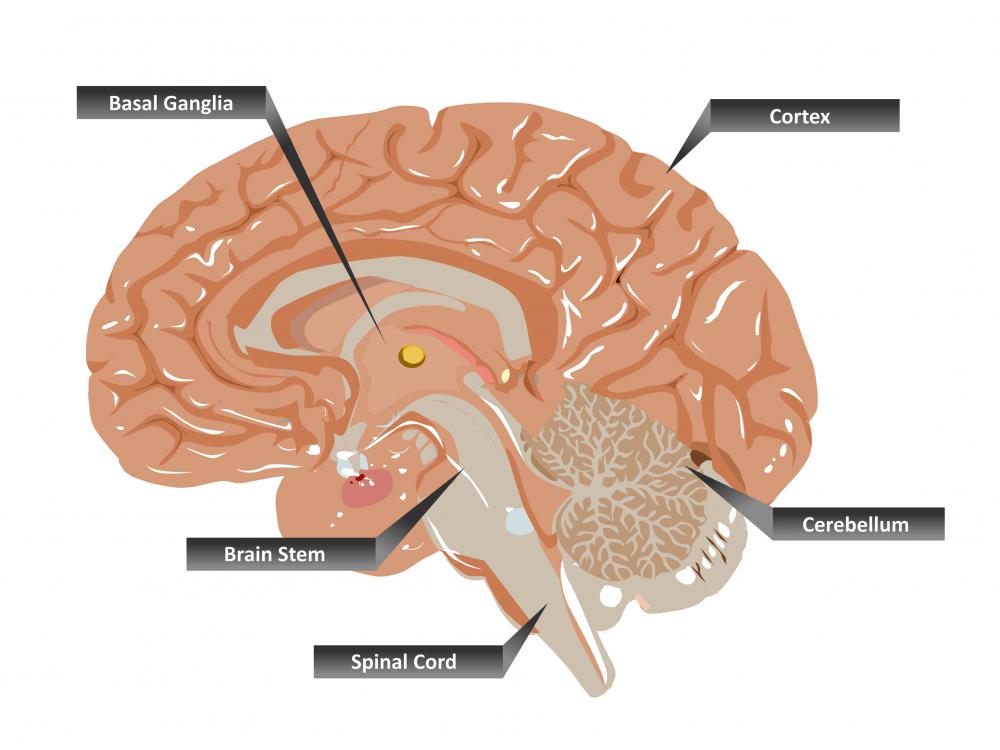At WiseGEEK, we're committed to delivering accurate, trustworthy information. Our expert-authored content is rigorously fact-checked and sourced from credible authorities. Discover how we uphold the highest standards in providing you with reliable knowledge.
What Are Motor Neuron Lesions?
A motor neuron lesion is any injury or abnormality in the nerves responsible for controlling the body's movement. Motor neuron lesions can have many different causes, including physical trauma, autoimmune disorders, and abnormalities in fetal development. They interfere with normal motor control and thus with movement, because the damaged neurons become less effective in their task of transmitting signals between the central nervous system and muscles. In addition to mobility in the limbs and abilities such as walking, they can also interfere with other motor functions, such as speaking, chewing, and swallowing. The effects can vary enormously, from minor impairments in muscle control to total paralysis or death.
These lesions are frequently divided into two categories, upper motor neuron lesions and lower motor neuron lesions. Upper motor neurons begin in the motor cortex of the brain and extend down into the brain stem and spinal cord, where they meet the lower motor neurons, which extend from the spine to the muscles. The effects of a lesion depend on where it is located. A common feature of both types of lesions are abnormalities in muscle tone or tonus, the partial muscle contractions that continuously occur in the body. The precise nature and severity of the symptoms caused by lesions depends on their size and location.

Lesions in the upper motor neurons commonly cause symptoms such as reduced strength, problems with fine motor control, and spasticity. Spasticity is a condition in which the person's muscle tone is increased to abnormal levels, resulting in a state of constant muscle tension called hypertonia. The muscles become tighter and less flexible, in some severe cases to the point of immobility, and the sufferer may have muscular spasms or develop problems with posture or gait. Excessive muscle tension can also cause overactive reflexes, or hyperreflexia.

A lower motor neuron lesion commonly causes flaccid paralysis, a condition in which the muscles become weak, and muscle tone becomes too low, a condition called hypotonia. This can result in partial or total loss of mobility in the affected muscles and can eventually result in atrophy and muscle wasting. These lesions can also cause diminished or completely absent reflexes, called hyporeflexia, and irregular contractions called fibrillations in the skeletal muscles.

Diseases affecting the motor neurons are often progressive in nature, causing greater damage to the nervous system and greater impairment over time, though this is not always the case. Upper motor neuron lesions are most commonly seen in people who suffer from cerebral palsy and are also the cause of primary lateral sclerosis and some forms of multiple sclerosis. Lower motor neuron lesions are seen in conditions such as progressive muscular atrophy, spinal muscular atrophy, and progressive bulbar palsy. Amyotrophic lateral sclerosis, commonly called Lou Gehrig's disease, affects both the upper and lower motor neurons.
AS FEATURED ON:
AS FEATURED ON:
















Discuss this Article
Post your comments